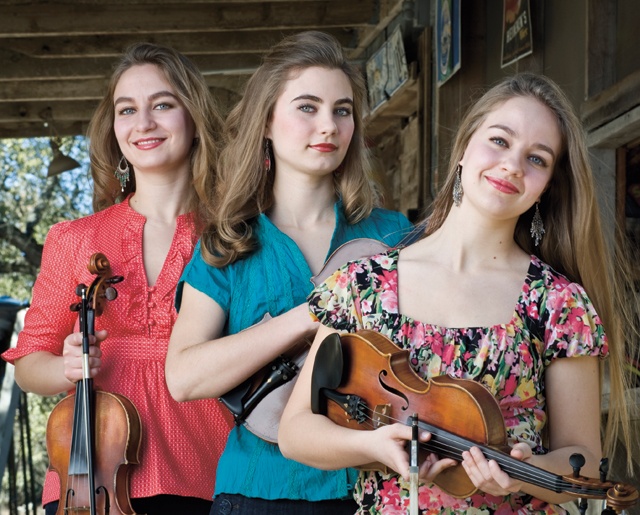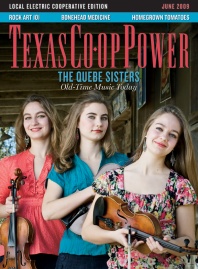Western swing fiddlers Hulda, Sophia and Grace Quebe (pronounced KWAY-bee) are 18, 21 and 23 years old, respectively, but the youngest song they play is about 50 years old. The average age of an instrument in the Quebe Sisters Band—the sisters on vocals and fiddle, Joey McKenzie on rhythm guitar and Drew Phelps on upright bass—is about 60 years old.
In concert, the band pays tribute to unremembered musicians, and its sets include compositions that never made it past 78s (records that play at the speed of 78 revolutions per minute), some of which the band members learned by holding cassette recorders up to phonographs.
At a show at The Oaks, a roadhouse outside Manor, east of Austin, Sophia introduced a tune called “Every Which-A-Way” by Moon Mullican.
“Moon Mullican is known as the king of the hillbilly piano players,” she said, “and we think this is one of his greatest songs. His record label for whatever reason didn’t record it—they left it off, but we still think it’s a great song.”
Before another number, McKenzie, a large, loquacious, world-champion fiddler and the Quebes’ fiddle and vocal instructor, told the audience that Bob Wills had a little-known brother named Billy Jack.
“Billy Jack Wills had one of the best Western swing bands I think there ever was,” he said. “He didn’t record much, but the album this next song (“Teardrops From My Eyes”) is on is one we always listen to on the road.”
Elderly Western swing musicians, formerly reconciled to the disappearance of their genre, make a pilgrimage to nearly every Quebe Sisters show.
Hulda, Grace and Sophia are outrageously charming. They have unmannered loveliness, skill, modesty and focused devotion. They have long, brown hair, pale skin, dark eyebrows and lustrous eyes. At The Oaks, they were wearing jeans, boots, summer blouses, barrettes and dangling, sedately glimmering earrings. They are former national fiddle champions and have been touring for five years, but they often say that they are going to “try” a song, and in concert they retain a residue of self-consciousness.
When they perform, the Quebes stand in a row at the front of the stage with what look like suppressed smiles on their faces. They pay strict attention to tone, sustain, vibrato, volume, tempo—nothing is understated or overstated, nothing jars: They practice all the time. The sound of three fiddles, rare even in the heyday of Western swing, rushes right into you.
Fixated on the Fiddle
The Quebes grew up in a devout Presbyterian household in Krum, a town of about 3,700 northwest of Denton. Their mother “home-schooled us,” Hulda says, “to get us away from the bad influences of public school.”
In 1998, the Quebe sisters saw McKenzie’s wife, Sherry, win a fiddle contest at the North Texas State Fair in Denton. Like her husband, Sherry was a former national fiddle champion. The girls hadn’t previously showed much interest in music—Suzuki violin lessons had bored them—but at the fair they were floored by Sherry’s virtuosity and the sound of the fiddle. Sherry lived close by in Burleson and agreed to give them lessons.
In 2000, the Quebes moved to Burleson to be closer to Joey and Sherry. “It was really providential,” Grace says. “We found a place to live on the same road.” By then, they were practicing six to eight hours a day.
The Quebes and McKenzies have trouble describing what it is about the fiddle that they find so beguiling. The Quebes say fiddle music just moves them. A few hours before their show at The Oaks, I visited with McKenzie and Phelps and the Quebes. I said maybe their attraction to the fiddle had something to do with the fact that, more than most instruments, the fiddle exposes your soul. “That’s kind of a badge of honor,” Joey McKenzie said.
Joey and Sherry McKenzie live in a world of 1930s and 1940s swing: Texas swing, gypsy swing, big band swing. They have at least 200 albums, tapes and recordings and a crank phonograph to hear the music just as its first listeners had. The girls became infatuated. The more they listened to the masters—Bob Wills, Spade Cooley, The Sons of the Pioneers, Django Reinhardt, Benny Goodman—the more modern music receded from their lives.
“There was something about the feeling of it,” Hulda says. “It’s something about that time. It’s like the world was jinxed, and there were a ton of great musicians.”
Since the McKenzies first introduced them to vintage swing, the Quebes haven’t listened to much else.
“When you listen to something today, it’s been run through a studio, it’s had people tune it and fix it—it’s so fake,” Hulda said. “They really might be good, but I can’t tell, because all of their voices have been run through a tuner or a midi (a musical instrument digital interface designed for recording and playing back music on digital synthesizers) or something.”
After confirming this bias, Sophia said, “We really like the Beatles—I guess that’s getting up to a little more modern,” and then laughed at herself. When asked to name current bands they like, the sisters had to stop and think and then named purists such as Asleep at the Wheel and the post-commercial Ricky Skaggs.
Joey and Sherry McKenzie taught the Quebes to play by ear, the way they had learned. “The good Western swing bands,” Joey said, “didn’t learn by reading music. A lot of the music we do is not written down.”
“It’s hard to get the feeling from a piece of paper,” Hulda said.
The Quebes use cassette recorders when they practice. “It’s really convenient ’cause you can just hit ‘record,’ and rewind it and listen right back to it,” Sophia said.
When I used a digital voice recorder to interview the sisters by themselves, they all remarked on it and asked if it would record live music and play it right back. When I said yes, and that it could hold thousands of recordings, Sophia said, “Well, I’m sure it would be a lot better—I’m sure we’ll be moving on to that when they stop making cassettes.”
On the Road Again
In addition to a heavy performance schedule in Texas, the Quebes go on several lengthy national tours each year—they’ve even appeared on the Grand Ole Opry—and often schedule Canada as a stop. When they’re home, they mostly practice and tend to band business: corresponding with fans, updating their website, filling CD orders, preparing accounting documents, and working on licensing agreements. They’ve had good offers from record labels but have deferred in favor of building their fan base and gaining more leverage as an independent act; they worry about pressure to commercialize their sound.
For the moment, they’re too busy for romantic relationships.
“We’re each other’s best friends,” Hulda said.
“We can be at home and talk about music for two hours,” Grace said.
“We have our main record player that’s hooked up to our stereo system at home,” Sophia said, “and it’ll play 45s and 33s, but it won’t play 78s, so we got another one that plays 78s.” They listen to reissues on CD, and Joey McKenzie copies LPs to CDs for them.
“We’ll turn on a record or a tape,” Grace said, “and listen to it and be like, ‘Did you hear that?’ And it’s something we’ve listened to for years: ‘Man, he sang that so well. Rewind that.’ We’ll just talk about a certain area, and it’s not like we’re really studying it, it’s just that we’re all really enjoying it. Joey was saying one time that you have to listen harder than you can. That sounds funny, but you can listen to something in a lot of different ways.”
The Quebes don’t own iPods, but Sophia has been thinking about getting one. “I just haven’t gotten around to it yet,” she said.
Allegiance to the Past
The Quebes’ music is direct from the 1940s through the ’60s, which is a beautiful accomplishment, but the pretty melodies and three-part harmonies have an era-specific sameness, and the Quebes all sing in the same smooth mode: light-bodied and largely undynamic. They could sound repetitive and imitative and oversweet, but they never do. At The Oaks, the band’s tightness and ardor elevated its work. On bass, Phelps was dense and demandingly buoyant—once, when he felt that the Quebes weren’t playing quite energetically enough, he leaned forward and nudged them with his shoulder. Behind the fiddles, McKenzie interjected a propulsive beat, attacking his chords, sometimes making his guitar purely percussive by muting its strings with a finger and raking them like washboard ribs.
In the small roadhouse, the Quebes’ allegiance to their instruments and to the tradition they have claimed was palpable. At any given time during the show, most of the audience was smiling.


